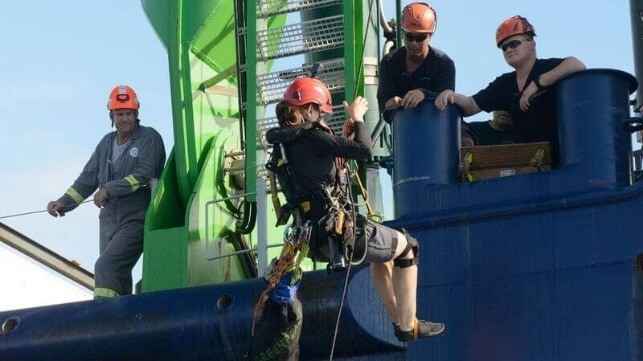Deep-Sea Mining Company Sues Greenpeace to Remove Activists From Ship

A small group of protesters from Greenpeace have hung up the operations of the deep-sea mining research vessel Coco, prompting the vessel's charterer to file a lawsuit seeking an injunction, the activist group said Tuesday.
Coco is on assignment in the Clarion-Clipperton Zone to evaluate a polymetallic nodule lease area. The Greenpeace vessel Arctic Sunrise rendezvoused with the vessel in order to interfere with its mission. On the water, Greenpeace has used two kayaks and two small boats to obstruct the ship's operations. In addition, a five-person climb team boarded the Coco's stern-mounted A-frame using a hook, rope and ascenders. The activists climbed up to the platform at the structure's top and occupied it in hopes of blocking operations.
According to Greenpeace, the Coco's charterer - NORI, a subsidiary of The Metals Company (TMC) - has filed suit in the Netherlands in order to force Greenpeace to halt the protest. The group says that NORI is seeking a fine of about $10 million if the protesters continue to block the ship's operations.
Greenpeace has shown no sign of giving up the protest, and NORI says that it has been given to understand that the disruption will continue until Coco leaves the mineral exploration area.
“Two kayaks, two small boats and five climbers have rocked this wannabe extractive industry to its core. This is the importance of peaceful activism and bearing witness to an industry that has always operated in the shadows. We will not look back and regret standing up when we had the chance to stop deep sea mining from ever starting," said Greenpeace spokesperson Louisa Casson in a statement.
TMC plans to file an application for international permission to begin seabed mining as early as July 2024, and Greenpeace claims that the Coco's expedition data will be used as part of the permitting request.
"On November 23, Greenpeace began actively disrupting our scientific operations, hindering the exact scientific work that was asked for by ISA Member States . . . Since then, Greenpeace’s disruptive actions have escalated with the explicit aim of stopping the science by, in their own words, “disrupting [our] attempt at collecting data,'" said TMC in a statement. "On November 25th, Greenpeace illegally boarded our vessel in a manner that puts our crew and theirs at serious risk, disrupting the research of dozens of scientists."
In a separate written statement, ISA Secretary-General Michael Lodge called for an immediate halt to the Greenpeace protest. In an open letter, he asked the Netherlands (Arctic Sunrise's flag state) to consider whether the vessel's operations are consistent with international and domestic maritime law.
"The circumstances described by NORI prima facie pose a serious threat to the safety of individuals present in the Exploration Area and to the marine environment," Lodge wrote.
24 nations and 800 experts have called for a moratorium on deep-sea mining until after more research has been done on the potential impact on marine life. The Clarion-Clipperton Zone is little studied, and scientific surveys of the area often uncover new species (sometimes dozens of them). Critics of deep-sea mining warn that potential impacts - sediment plumes blanketing nearby areas, toxins released into the water column from mining wastes, habitat destruction from the removal of the nodules themselves - are unknown and potentially harmful to native species.
In one example of the potential impact, a research team led by scientists at the Helmholtz Centre for Ocean Research and the Smithsonian recently found that suspended sediment in the mid-ocean water column could be harmful to helmet jellyfish, a relatively hardy species that provides food for predators. More delicate jellyfish could fare worse, biologist Jeffrey Drazen told the New York Times, with implications for the food web.

that matters most
Get the latest maritime news delivered to your inbox daily.
For its part, TMC suggests that it is undertaking the needed research, and asserts that the Greenpeace intervention is aimed at stopping data collection required to determine the impact of deep-sea mining.
"[Greenpeace's] actions are anti-science, dangerous, illegal and directly challenge the spirit of multilateralism codified by the United Nations Convention on the Law of the Sea and the rules that all ISA Member States have agreed to follow. We will use all legal measures available to us to protect the rights of our stakeholders and prevent this illegal activity," said TMC in a statement. "As they would have it, theirs is the only voice that matters and the science must stop."
